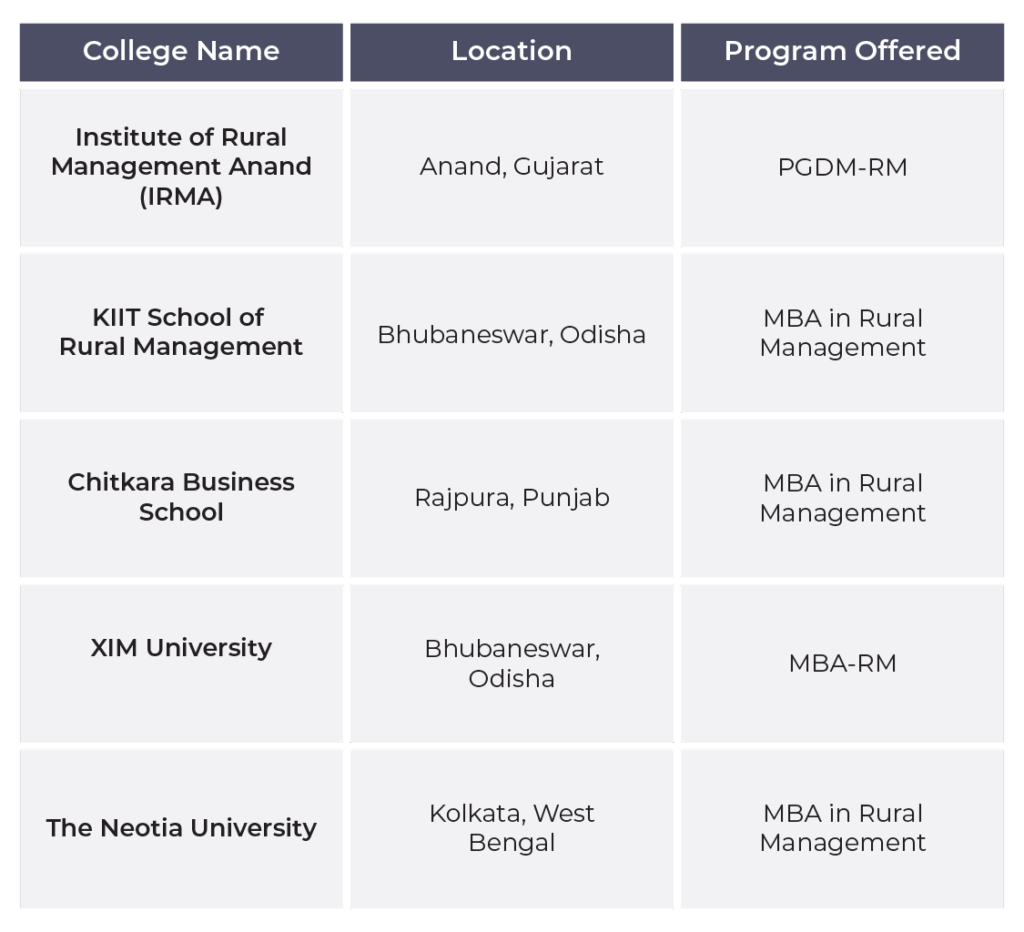Rural India houses 63.13% of the nation’s population and drives economic growth through agriculture, handicrafts, and rural enterprises.. Government initiatives like Digital India and Skill India have created new opportunities for professionals pursuing a career in rural development. Specialised rural management courses now prepare professionals to tackle rural challenges. This allows individuals to make an impact in the field, from sustainable farming to rural businesses.
What is Rural Management?
Rural management applies modern management principles to address challenges and opportunities in rural areas, much like how urban planning careers focus on city development. It involves systematic planning, organisation, and execution of development initiatives that improve rural quality of life while ensuring sustainable economic growth.
The focus areas of rural management include:
- Agriculture and allied activities: Managing farming, livestock, and related industries.
- Rural healthcare systems: Making healthcare services available and accessible.
- Infrastructure development projects: Building and maintaining roads, water supply, and energy systems.
- Primary and adult education programs: Conducting literacy and skill-building initiatives.
- Microfinance and rural banking: Provision of financial services to sustain small-scale businesses and livelihoods.
- Community-based development initiatives: Involving local people in development programs.
Educational Pathways in Rural Management
Academic preparation for a career in rural management includes several educational routes that combine theoretical knowledge with practical field experience.
- Undergraduate Courses: Bachelor’s in Rural Development covers economics, sociology, and development studies. Agricultural Economics focuses on the economic aspects of rural and agricultural systems. Rural Studies programs provide interdisciplinary perspectives on rural communities.
- Postgraduate Courses: MBA in rural management programs and MBA in rural development programs are designed to integrate the core management subjects with rural development specialisations. Master of Rural Management (MRM) aims at the rural aspects only without any major business components. PGDM in Rural Management is more to the point of providing the industry needs with the help of the various practical sessions.
- Specialised Programs: Rural estate management courses deal with land administration, property management, and rural real estate development. Rural land management courses mainly focus on the methods of sustainable land use, conservation practices, and community land rights. Rural business management programs are geared towards training in entrepreneurship, rural enterprises, and market development.
Best Colleges for MBA in Rural Management in India
The best MBA in rural management colleges offer academic quality, industry connections and high placement rates.

Career Opportunities in Rural Management
Career opportunities in rural development span government, private sector, non-profit organisations, and international agencies.
- Rural Development Officer: Implements schemes and programs of the government at the ground level. These officers facilitate community engagement, project review, and stakeholder coordination to deliver effective programs.
- NGO Project Manager: Prepares and executes development projects of non-governmental organisations. They work with communities, plan resources, and deliver project outcomes within the timelines and budgets.
- CSR Manager: The position integrates business knowledge and social impact programs, project management, stakeholder engagement, and result monitoring.
- Microfinance Specialist: Provides financial services to underserved rural populations. They need to understand rural financial needs, assess risks, and develop innovative financial products for rural markets.
- Policy Analyst: Researches rural development challenges, analyses existing policies, and recommends improvements. While professionals in urban planning careers focus on city policies, rural policy analysts address agricultural issues, infrastructure, and village governance. Strong analytical skills and knowledge of both policy and local realities are essential in this field.
- Agri-Business Manager: Manages agricultural enterprises, rural supply chains, and market development initiatives. They combine agricultural knowledge with business management skills to create sustainable rural enterprises.
Skills Required for a Career in Rural Management
Having a sound rural management scope requires technical knowledge, interpersonal skills, and cultural sensitivity.
- Communication Skills: The Ability to interact effectively with rural communities, government officials, and development partners is important. Communicating in local languages and adapting style to different audiences enhances effectiveness.
- Project Management: This ability to schedule, execute, and oversee development projects within rural institutions is important. The four pillars of achieving a successful project outcome are efficient management of the resources, time, stakeholders, and impact assessment.
- Financial Acumen: This is knowledge of how to budget and the functioning of the rural financial systems. Establishing sustainable financing structures offers the necessary funding to rural projects and businesses.
- Cultural Sensitivity: It is also vital to respect the local traditions, social organisation, and community processes. Working within the cultural frameworks enhances the likelihood of acceptance and the ability to make a change.
- Problem-Solving: It is important to be able to point out problems that are specific to rural settings. Researching operationally effective solutions on a limited resource base and realigning strategy to the local environments brings outcomes.
Conclusion
Rural management offers promising career prospects with growing job opportunities in rural development. Government enterprises, state projects, and innovations provide various rural sector employment opportunities. To pursue a profession in this area, one needs an education and a set of competencies, as well as experience through an internship. Rural management offers a chance to create a significant impact in policy, implementation, CSR, or entrepreneurship.
Want to pursue a career in rural management? Explore Mindler’s career assessment tools to see how your skills and interests align with this field.
Frequently Asked Questions
- How can I choose the right specialisation in rural management?
Majoring in agriculture, rural finance, education or social development, it is worth considering your personal interests and abilities. Research coursework on rural management, explore internship programs in other industries, and connect with individuals in the career fields you are interested in. Another factor to consider when making a decision is the trend in the labour market, career development, and how well each alternative fits your personal values.
- Can I work in rural development without relocating to villages?
Yes, the projects, which are categorised as rural development jobs, include project planning, policy analysis, monitoring and evaluation, and strategic functions located in the urban offices. Rural-based jobs at government departments, non-governmental organisations (NGO) headquarters, corporate social responsibility department,s and consulting firms do not require permanent residence in rural areas, but field visits are still required.
- Is an MBA mandatory for a career in rural development?
MBA enhances professional growth and gives an opportunity to attain leadership positions, but it is not necessarily a requirement. The lowest level jobs usually demand a bachelor’s degree in social sciences, agriculture, economics, or business studies. Specialised postgraduate education becomes important in order to reach senior management positions and increase pay.
- What internships help in building a career in rural management?
Locate an internship at an existing NGO that works in rural regions, government service agencies that carry out activities in rural regions, companies with social responsibility departments, consultants with advisory practices that concentrate on rural development, and global development agencies. SEWA, Grameen Foundation, or government programs like MGNREGA offer potential exposure and networking to the participants to improve career opportunities.
- Are there international opportunities in rural management?
A large number of these large organisations, such as the United Nations Development Programme (UNDP), World Bank, Asian Development Bank, and NGOs around the world, employ professionals to implement rural development projects in India and other developing nations. The bilateral development agencies of Germany, the United Kingdom, and Japan also provide opportunities to Indian professionals to make their contribution to global rural development programs.








